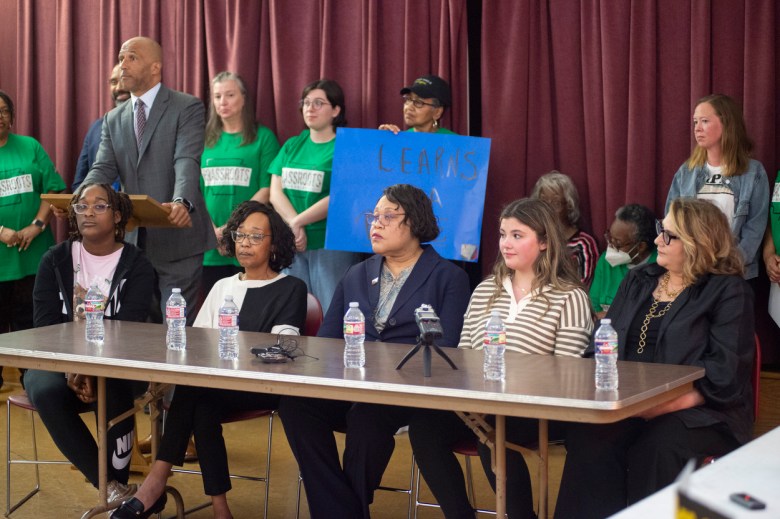
A federal judge in Little Rock issued an order Tuesday that guarantees two Central High teachers who are suing the state over an Arkansas law prohibiting “critical race theory” and “indoctrination” in the classroom won’t be punished or prevented from teaching controversial topics — but stopped short of blocking the law on a statewide basis.
The ruling from U.S. District Judge Lee Rudofsky followed a hearing last week in the lawsuit, which seeks to overturn Section 16 of the Arkansas LEARNS Act. It does not challenge other elements of the far-reaching education law, which has been a centerpiece of Gov. Sarah Huckabee Sanders’ policy agenda. The lawsuit is still in its early stages, and Rudofsky’s ruling Tuesday was only on the plaintiffs’ motion for a preliminary injunction to block Section 16.
The plaintiffs in the case are Central High teachers Ruthie Walls and Colton Gilbert, along with two Central High students, their mothers, and the Arkansas State Conference of the NAACP.
The lawsuit cites the state’s decision last summer to stop offering state credit for a pilot AP African American Studies course, which Walls teaches at Central. The Arkansas Department of Education said at the time the class might run afoul of Section 16 of LEARNS, which was passed by the state Legislature in spring 2023.
Since then, Education Secretary Jacob Oliva — one of the defendants in the suit, along with Sanders and members of the state Board of Education — has claimed that the state’s actions last year were only about the AP class being in a pilot phase and has steered clear of mentioning “indoctrination” or “critical race theory”
Lawyers with the Arkansas attorney general’s office told Rudofsky at last week’s hearing that Section 16 was much less broad than critics have alleged. It doesn’t seek to outright prohibit certain topics or ideas, they said, but to prevent situations in which a teacher forces indoctrination upon a student, such as by penalizing the student for not accepting the validity of those ideas.
In his 50-page ruling, Rudofsky said he accepts the state’s claim in that regard, justifying his order’s narrow application.
The state had “made crystal clear that … Section 16 does not prevent classroom instruction that teaches, uses, or refers to any theory, idea, or ideology,” he wrote. Any judge in the future would almost certainly prevent the state “from changing their position on the reach of Section 16,” Rudofsky said.
“Accordingly, although the court’s preliminary injunction will be quite narrow, this order as a whole should give comfort to teachers across the state (and to their students) that Section 16 does not prohibit teachers from teaching about, using, or referring to Critical Race Theory or any other theory, ideology, or idea so long as the teachers do not compel their students to accept as valid such theory, ideology, or idea,” he continued.
Mike Laux, one of the attorneys representing the plaintiffs, said the ruling was “a victory” and “validation” despite its narrow scope.
“If Judge Rudofsky had denied our motion entirely, it would say nothing about the viability of the case overall. However, his granting even a portion of our motion definitely speaks to the viability of the claims going forward,” Laux said.
Attorney General Tim Griffin also claimed the ruling as a win.
“The very limited injunction merely prohibits doing what Arkansas was never doing in the first place,” he said in a statement. “I look forward to continuing our enforcement of the statute as written rather than as Plaintiffs would choose to wrongly interpret it.”
Update: The Lawyers’ Committee for Civil Rights Under Law, a group that’s helping represent the plaintiffs, celebrated the ruling.
“The court’s ruling has essentially gutted Arkansas’ classroom censorship law to render the law virtually meaningless,” attorney David Hinojosa said in a statement. “Governor Sanders and Secretary of Education Jacob Oliva had already walked back the law in their response briefing, stating that Critical Race Theory could be taught in Arkansas’ classrooms. Judge Rudofsky further narrows the scope of the LEARNS Act so that students won’t be forced to learn a false version of this country’s history of discrimination or continuing struggles with racial justice. The ruling should provide teachers greater comfort in teaching the truth, and challenging students to broaden their perspectives.”
